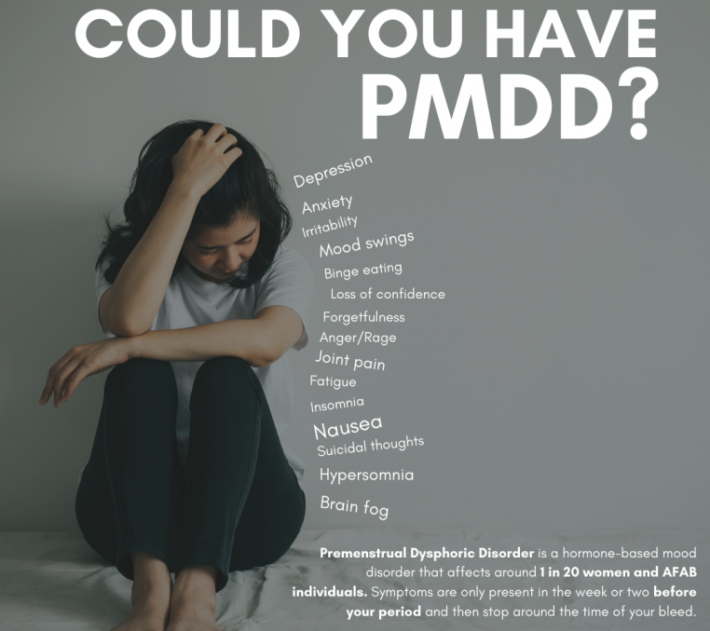CONNECT THE DOTS between hormones & mental health
#PMDAwarenessMonth2022
- Premenstrual Disorders include Premenstrual Dysphoric Disorder (PMDD) & Premenstrual Exacerbation (PME)
- Today’s post will focus on PMDD. Keep an eye out for a future post this month on PME.
PMDD- What is it?
- Premenstrual Dysphoric Disorder (PMDD) is a cyclical, hormone-based mood disorder.
- PMDD became an official diagnosis in the DSM-V as of 2013
- An estimated 5.5% of women of reproductive age experience severe distress and dysfunction due to PMDD.
- Symptoms arise between ovulation and menstruation, aka the luteal phase of the menstrual cycle, and subside within a few days of menstruation
- PMDD is a severe negative reaction in the brain to the natural rise and fall of estrogen and progesterone.
- Symptoms can worsen over time and/or around large fluctuations in hormones that occur during menarche, pregnancy, birth, miscarriage, and perimenopause.
Why does it matter?
- PMDD can have a severe impact on a woman’s functioning and well-being. • Some women experience damaging and impulsive behaviors (e.g. suddenly leaving a job or ending a relationship)
- 30% of those with PMDD will attempt suicide
How do I know if I have it?
- The only way to diagnose PMDD is by tracking symptoms daily for at least two menstrual cycles
- Symptoms of PMDD:
- Significant mood/emotional changes (e.g. mood swings, feeling suddenly sad or tearful, increased sensitivity to rejection)
- Irritability, anger, or increased interpersonal conflict
- Depressed mood, feelings of hopelessness, feeling worthless
- Anxiety, tension, or feeling of being keyed up or on edge
- Decreased interest in usual activities (e.g. work, school, friends, hobbies) • Difficulties concentrating; brain fog
- Tiredness or low-energy
- Changes in appetite- food cravings, overeating, or binge eating
- Hypersomnia (excessive sleepiness) or insomnia
- Feeling overwhelmed or out of control
- Physical symptoms such as breast tenderness or swelling, joint or muscle pain, bloating, or weight gain
** A diagnosis of PMDD requires the presence of at least five of these symptoms, one of which must be a “core emotional symptom” (listed in bold)
How should I track my symptoms?
- Printable trackers can be found at https://iapmd.org/symptom-tracker
- Me v PMDD is a free PMDD specific tracking app https://www.mevpmdd.com
DEPENDING ON THE SEVERITY OF YOUR SYMPTOMS HERE ARE RESOURCE IDEAS:
CALL YOUR OB, CONFIDE IN A TRUSTED FAMILY MEMBER OR FRIEND, GO TO THE ER, CALL 911, OR CALL THE NATIONAL SUICIDE PREVENTION LIFELINE @ 1-800-273-8255.
